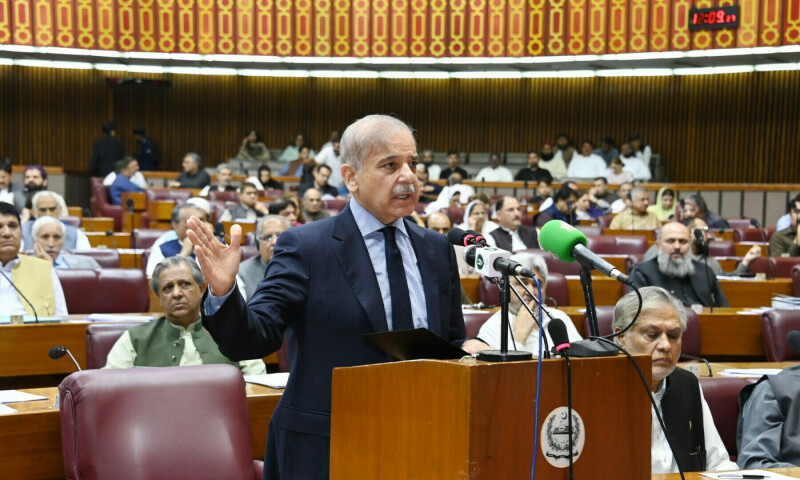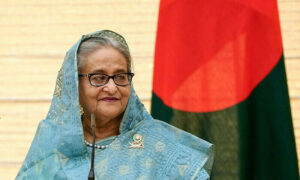• Advises against politicising the issue; says agriculture, industry cannot progress sans cheaper electricity
• Calls out inefficiencies, corruption in FBR, energy sector
• Tells cabinet he has requested China to reprofile Pakistan’s debt
ISLAMABAD: A day after a protesting Jamaat-i-Islami gave a 48-hour deadline to the government to slash electricity prices, Prime Minister Shehbaz Sharif on Friday said the government was focused on providing relief to energy consumers and cautioned against politicising the issue.
“Doing politics on the electricity issue is tantamount to humiliating people,” the prime minister said while presiding over a cabinet meeting, adding “the government needs to lower electricity prices to boost exports”.
The remarks came against the backdrop of the sit-in that the JI has been holding for the past several days over inflated electricity bills.
JI emir Hafiz Naeemur Rehman has threatened to convert the protest sit-in into a movement for toppling the government if electricity tariff is not reduced. On Thursday, the party set a 48-hour deadline for the government to reduce the tariff.
At the cabinet meeting, PM Shehbaz noted that without reducing power tariff, neither the agriculture sector nor the industry could expand effectively. “Competitiveness in industry is directly linked to lower electricity prices.”
However, he criticised the use of electricity tariff issue for political gain, calling it disrespectful to the general public.
Mentioning inefficiencies and corruption in the Federal Bureau of Revenue (FBR) and the energy sector, he said that making these institutions efficient would put the country on the right path.
He said the government was aware of people’s problems and doing its best to address them.
He recalled that the PML-N government had resolved the issue of 20-hour daily load-shedding a few years ago. At that time, few were willing to invest significantly in electricity production, with China being the only country showing interest in making the investment.
In 2015, the PM mentioned that some of the fastest power-producing plants in history were installed. The government set up four LNG plants, each with a capacity of 500MW and a turbine efficiency of 64 per cent. Credit for these cost-effective plants went to Nawaz Sharif, he said. At that time, Nepra’s tariff was $8.5, and plants were built for just $450,000. These agreements should not be criticised as they represented a sincere effort to address Pakistan’s most pressing challenge, he noted.
The government extended the last date for paying electricity bills by 10 days, said the prime minister. Likewise, he added, the electricity tariff for the industry had been reduced by Rs8.5 per unit. A Rs170 billion subsidy was being provided to the industry.
He said collective efforts were afoot to check electricity theft.
He expressed concern that the salaried class had been heavily burdened. However, he pointed out that the government had provided a Rs50 billion subsidy for those consuming up to 200 units of electricity per month.
He said efforts were underway to resolve issues with independent power producers, but acknowledged that the problem could not be resolved overnight.
Letter to China
PM Shehbaz informed the cabinet meeting that through a letter he had requested the Chinese government for debt reprofiling for Pakistan.
Apparently, the premier has written to the Chinese government to secure IMF’s approval for the $7bn economic bailout by next month.
“I have written a letter to China, it’s a matter of public domain now, for [debt] reprofiling,” the PM said, adding that Chinese President Xi Jinping had shown “keen interest in his idea” of using local coal to cut down imports.
“I told the president that Thar coal could help the country cut down on imports and save $1 billion in foreign exchange,” he said.
PM Shehbaz pointed out that Finance Minister Muhammad Aurangzeb had “very good meetings” in China during his recent visit, noting that efforts were underway to implement structural reforms for reducing circular debt.
Besides, the cabinet approved the signing of an MoU on Trade Promotion Cooperation to enhance trade between China and Pakistan.
The decision was made on the recommendation of the Ministry of Commerce. The MoU is aimed at boosting bilateral trade with focus on several key areas such as smartphone production, new energy vehicles, textiles, agricultural product processing, pharmaceutical manufacturing, and information technology.
The cabinet also approved the enactment of legislation concerning the charter of the National University of Modern Languages, and a bill for establishing King Hammad University of Nursing and Associated Medical Sciences being set up in cooperation with Bahrain. The university will impart education in Pakistan to meet modern-day challenges.
Published in Dawn, August 3rd, 2024







